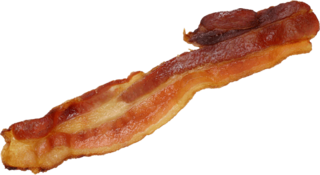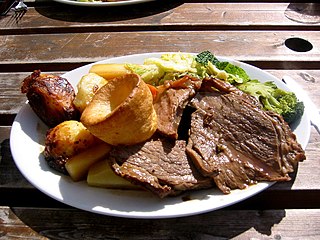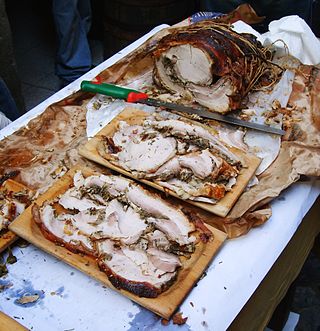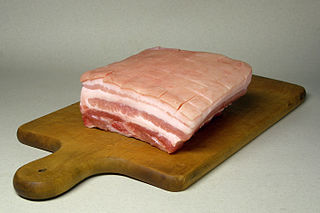
Midwestern cuisine is a regional cuisine of the American Midwest. It draws its culinary roots most significantly from the cuisines of Central, Northern and Eastern Europe, and Indigenous cuisine of the Americas, and is influenced by regionally and locally grown foodstuffs and cultural diversity.

Bacon is a type of salt-cured pork made from various cuts, typically the belly or less fatty parts of the back. It is eaten as a side dish, used as a central ingredient, or as a flavouring or accent.

English cuisine encompasses the cooking styles, traditions and recipes associated with England. It has distinctive attributes of its own, but is also very similar to wider British cuisine, partly historically and partly due to the import of ingredients and ideas from the Americas, China, and India during the time of the British Empire and as a result of post-war immigration.

A sausage is a type of meat product usually made from ground meat—often pork, beef, or poultry—along with salt, spices and other flavourings. Other ingredients, such as grains or breadcrumbs may be included as fillers or extenders.

A Sunday roast or roast dinner is a traditional meal of British origin. Although it can be consumed throughout the week, it is traditionally consumed on Sunday. It consists of roasted meat, mashed potatoes, roasted potatoes and accompaniments such as Yorkshire pudding, stuffing, gravy, and condiments such as apple sauce, mint sauce, or redcurrant sauce. A wide range of vegetables can be served as part of a roast dinner, such as broccoli, Brussels sprouts, cabbage, carrots, cauliflower, parsnips, or peas, which can be boiled, steamed, or roasted alongside the meat and potatoes.
Venison originally meant the meat of a game animal but now refers primarily to the meat of deer. Venison can be used to refer to any part of the animal, so long as it is edible, including the internal organs. Venison, much like beef or pork, is categorized into specific cuts, including roast, sirloin, and ribs.

Meatloaf is a dish of ground meat that has been combined with other ingredients and formed into the shape of a loaf, then baked or smoked. The final shape is either hand-formed on a baking tray, or pan-formed by cooking it in a loaf pan. It is usually made with ground beef, although ground lamb, pork, veal, venison, poultry, and seafood are also used, sometimes in combination. Vegetarian adaptations of meatloaf may use imitation meat or pulses.

Doner kebab, also spelled as döner kebab, is a dish of Turkish origin made of meat cooked on a vertical rotisserie. Seasoned meat stacked in the shape of an inverted cone is turned slowly on the rotisserie, next to a vertical cooking element. The operator uses a knife to slice thin shavings from the outer layer of the meat as it cooks. The vertical rotisserie was invented in the 19th-century Ottoman Empire, and dishes such as the Arab shawarma, Greek gyros, Canadian donair, and Mexican al pastor are derived from this.

Comfort food is food that provides a nostalgic or sentimental value to someone, and may be characterized by its high caloric nature, high carbohydrate level, or simple preparation. The nostalgia may be specific to an individual, or it may apply to a specific culture.

Porchetta is a savory, fatty, and moist boneless pork roast of Italian culinary tradition. The carcass is deboned and spitted or roasted traditionally over wood for at least eight hours, fat and skin still on. In some traditions, porchetta is stuffed with liver and wild fennel, though many versions do not involve stuffing. Porchetta is usually heavily salted and can be stuffed with garlic, rosemary, fennel, or other herbs, often wild. Porchetta has been selected by the Italian Ministry of Agricultural, Food and Forestry Policy as a prodotto agroalimentare tradizionale, one of a list of traditional Italian foods held to have cultural relevance.
Bisto is a popular and well-known brand of gravy and other food products in the United Kingdom and Ireland, currently owned by Premier Foods.

Barbecue varies by the type of meat, sauce, rub, or other flavorings used, the point in barbecuing at which they are added, the role smoke plays, the equipment and fuel used, cooking temperature, and cooking time.

The cuisine of Philadelphia was shaped largely by the city's mixture of ethnicities, available foodstuffs and history. Certain foods have become associated with the city.

Pork is the culinary name for the meat of the pig. It is the most commonly consumed meat worldwide, with evidence of pig husbandry dating back to 5000 BCE.
Pork Farms is a Nottingham-based British producer and distributor of mainly pork-based bakery products. The company grew from a pie shop founded in 1931, and was floated on the London Stock Exchange in 1971. After several sales and amalgamations, since 2017 the brand has been owned by Lloyds Development Capital.

A steak is a thick cut of meat generally sliced across the muscle fibers, sometimes including a bone. It is normally grilled or fried. Steak can be diced, cooked in sauce, such as in steak and kidney pie, or minced and formed into patties, such as hamburgers.
C Lidgate is a butchers shop in Holland Park, London. It was founded in 1850 by Charles Lidgate and remains in the hands of his descendants today.

Pork rind is the culinary term for the skin of a pig. It can be used in many different ways.














